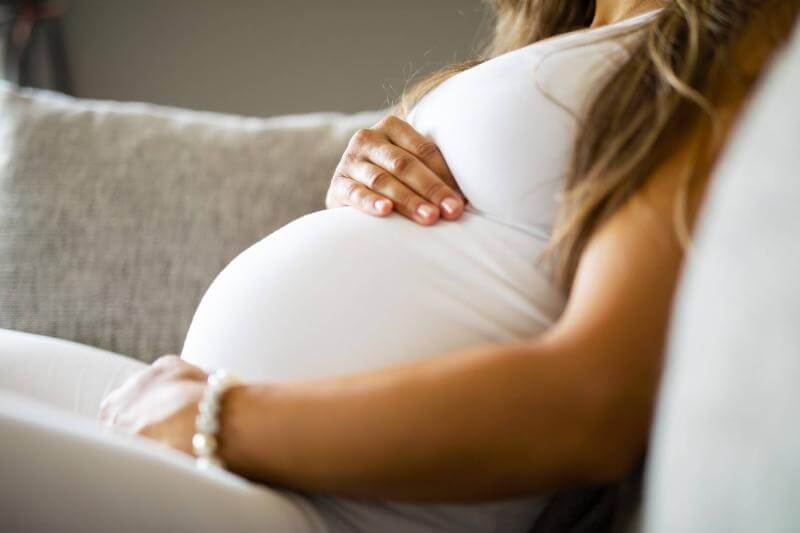
To mark this awareness-raising day, Hôpital de La Tour is giving the floor to its specialists in a brand-new podcast, to help expectant mothers and healthcare professionals better understand this complex pathology, its symptoms, risk factors and ways of preventing it.
What is pre-eclampsia?
Pre-eclampsia is a disease that occurs during pregnancy, most often in the third trimester, but can also appear as early as the 20th week or even post-partum. It is characterized by high blood pressure, which may or may not be associated with signs of damage to maternal organs (kidneys, liver, brain), or with slowed foetal growth. The cause is a defect in placental implantation at the start of pregnancy, which impedes vascularization and leads to hypo-perfusion of the placenta. The placenta then releases toxic substances into the mother's bloodstream, which can damage the blood vessels.
This dysfunction can have serious consequences for the mother (severe hypertension, cerebral hemorrhage, kidney or liver damage, convulsions in cases of eclampsia) and for the baby (intra-uterine growth retardation, prematurity, even death in utero). The only definitive treatment is delivery. However, appropriate treatment can prolong pregnancy and improve maternal and fetal prognosis.
Symptoms are varied: headaches, visual disturbances (spots, blurs, flashes), ringing in the ears, abdominal pain, swelling of the hands, feet or face. These signs should raise the alarm and prompt prompt consultation.
Read the condition sheet to find out more
Pre-eclampsia: a disease that needs to be better understood - experts share their views
In a podcast published on the occasion of World Pre-Eclampsia Day, experts from Hôpital de La Tour shed light on the many facets of this condition.
Dr. Nicole Jastrow-Meyer, a specialist in gynecology and obstetrics and maternal-fetal medicine, describes the mechanism of the disease: “In a normal pregnancy, the uterine vessels dilate to allow good irrigation of the placenta. In pre-eclampsia, this process goes awry, resulting in insufficient perfusion, release of toxic substances into the maternal circulation and multi-organ damage.”
Midwife Grace Bahouka recalls the warning signs: “Persistent headaches, visual disturbances, stomach pains and unusual oedemas should prompt consultation. Diagnosis is based on the appearance of high blood pressure (above 140/90 mmHg) and the presence of protein in the urine.”
Dr. Agnès Ditisheim, internist and co-founder of the Centre de médecine fœto-maternelle, adds: “Women at risk include those in their first pregnancy, suffering from hypertension, diabetes, obesity, autoimmune diseases (such as lupus), twin pregnancies or using MAP. Screening in the 1st trimester and low-dose aspirin are real preventive measures.
Better understanding pre-eclampsia means better prevention, diagnosis and management. A clear message, conveyed with expertise and commitment by the professionals at Hôpital de La Tour.
To find out more, discover the full explanations of our specialists in this podcast produced on the occasion of World Pre-Eclampsia Day. An enriching discussion to better understand the issues surrounding this disease and the tools at our disposal to reduce its risks.
They experienced pre-eclampsia: five testimonials
“My pregnancy seemed perfect, until my midwife discovered that my blood pressure was too high at the end of my 2nd trimester. In a matter of hours, everything turned upside down: severe pre-eclampsia, hospitalization, emergency Caesarean section. My son was born at 30 weeks, weighing 1kg250. A year later, we're doing fine. I should have listened to my instincts and asked more questions.” Laura
“I had several signs in the 3rd trimester, but my tests were reassuring. It wasn't until I gave birth, at 38 weeks, that I was diagnosed with severe pre-eclampsia. I then learned that I had HELLP syndrome. Today, my daughter and I are doing well, but I advise mothers to pay attention to their bodies.” Marguerite
“I'm a nurse in Geneva. I lost my son Alessandro at 33 weeks' gestation, following a sudden onset of eclampsia. Perinatal bereavement is still too taboo. We need to talk about it, to support women going through these ordeals.” Aude
“I'd like to share three important messages. All pregnant women should be aware of the symptoms of pre-eclampsia, and seek immediate medical attention if any of them appear. It's also important to realize that pre-eclampsia can be life-threatening for both mother and baby. Finally, after pre-eclampsia, cardiovascular and nephrological follow-up must be put in place for the long term.” Marine
“At five months, I was swollen all over, out of breath, seeing flies... but I thought it was normal. My husband urged me to call for help when I stopped speaking coherently. Verdict: severe pre-eclampsia, emergency delivery. My son is healthy today, but I'll never forget the shock. For my next pregnancy, I will read all the brochures, follow the recommendations, and no longer ignore the signals.” Laurie
Specialized care at Hôpital de La Tour
Hôpital de La Tour has a care structure dedicated to high-risk pregnancies, with a Maternal-Fetal Medicine Center (MFM), a maternity ward and a multidisciplinary team trained to react quickly and effectively. In cases of pre-eclampsia, every decision is taken in consultation with obstetricians, internists, anesthetists, midwives and neonatologists.
The hospital also offers a Sport and Pregnancy program, supervised by physiotherapists and health coaches, to encourage appropriate physical activity, a key factor in prevention.
When should you seek medical advice? Warning signs to be aware of
It is essential to be aware of the symptoms suggestive of pre-eclampsia in order to consult a specialist as soon as possible:
- Persistent headaches
- Blurred vision (spots, flashes of light)
- Stomach or liver pain
- Ringing in the ears
- Edema of the face, hands or feet
- Unexplained rapid weight gain
A simple blood pressure check and urinalysis can lead to an early diagnosis. 1st trimester screening, now a standard practice at La Tour Hospital, enables us to identify women at risk and take early action.
Patients treated at La Tour benefit from comprehensive support before, during and after pregnancy.